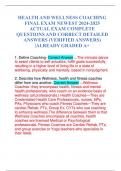HEALTH AND WELLNESS COACHING
FINAL EXAM NEWEST 2024-2025
ACTUAL EXAM COMPLETE
QUESTIONS AND CORRECT DETAILED
ANSWERS (VERIFIED ANSWERS)
|ALREADY GRADED A+
1. Define Coaching- Correct Answer ...The intricate dance
to assist clients to self actualize, fulfill goals successfully,
resulting in a higher level of living life in a state of
wellbeing, physically and mentally, based in nonjudgment.
2. Describe how Wellness, health and fitness coaches
differ from one another. Correct Answer ...Wellness
Coaches--they encompass health, fitness and mental
health professionals, who coach on an evidence basis of
wellness (all professionals.) Health Coaches—They are
Credentialed Health Care Professionals, nurses, NPs,
PAs, Physicians who coach.Fitness Coaches—They are
cardiac Rehab, PTs, Group Ex, CYTs who use coaching
to enhance wellness.The difference between them is that
Wellness Coaches encompass all coaches, health
coaches are licensed Medical or Psychological
professionals. Fitness Coaches are Cardiac Rehab, PTs,
and group exercise or Yoga teachers who specialize in
their fields.
,Wellness Coaches--they encompass health, fitness and
mental health professionals, who coach on an evidence
basis of wellness (all professionals.) Health Coaches—
They are Credentialed Health Care Professionals, nurses,
NPs, PAs, Physicians who coach.
Fitness Coaches—They are cardiac Rehab, PTs, Group
Ex, CYTs who use coaching to enhance wellness.
The difference between them is that Wellness
Coaches encompass all coaches, health coaches are
licensed Medical or Psychological professionals.
Fitness Coaches are Cardiac Rehab, PTs, and group
exercise or Yoga teachers who specialize in their
fields.
3. Distinguish between Wellness Coaching and other
forms of coaching. Correct Answer
Corporate coaches are used to improve work place
performance of execs and upper management. Life
Coaches help people through a transition such as career,
retirement, divorce, life quality improvement, time
management, finding passion or purpose. Wellness
specifically focuses on wellbeing—improvement of health
by examining personal goals, values and behaviors to
make changes in fitness, nutrition, weight, health risks,
stress management, smoking cessation, etc, towards life
satisfaction.
,4. Why are professional coaches needed in areas of
physical and mental wellness? Correct Answer
Too many people have weight issues, don't exercise or eat
well. They enable people to be done with quick fixes,
overcome challenges, and to master health and wellbeing
and make changes that last.
5. Distinguish between the coach approach and the expert
approach to learning and growth. Correct Answer
Coaching is drawing out knowledge the client already has,
to bring about change. They work in tandem with a client,
at the client's level of self efficacy to make changes. The
client is in control; they find their own answers; coaches
rarely offer advice. Experts teach, analyze, problems, offer
advice, prescribe solutions recommend goals, develop
strategies, teach new skills, and with this lets subtly let
clients off the hook of responsibility -"you aren't in charge."
6. Distinguish between coaching and therapy. Correct
Answer
Therapy treats diagnosable disorders. (DSM-IV).
Coaching does not diagnose, prescribe, and coaches do
not work with people suffering from clinical dysfunction.
Coaches work with people who are already doing things
well who want to improve.
7. Identify and explain 3 key components of coaching used
by professional and wellness coaches. Correct Answer
, A. Values—Coaches believe clients are whole, creative,
resourceful, resilient. Clients figure out their best paths;
coaches help chip away at the outside to show the pure
beauty within. Coaches value the process more than their
own expert knowledge.
B. Relational skill—Coaches bring a beginner's mind,
engage, arouse, energize, and challenge clients to do the
work needed to create desired change. The qualities of
good relational skills are; listening deeply, inquiry, (simple
reflection) but also mindfulness, empathy, authenticity,
affirmation, courage, zest, playfulness, and warmth.
C. Coaching process—There are many. The most
important are the Trans-theoretical model of change, and
to approach clients where they are, not where we as
coaches want them to be. The stages of change are pre-
contemplation, contemplation, preparation, action, and
maintenance. Other systems are Appreciative Inquiry,
Non-violent communication, motivational interviewing,
social cognitive theory, ultimately dancing with the client in
relational flow. Both, but mostly the client, are highly
engaged, awake, challenged, and stretched.
8. Describe how people can use coaching to master
wellness. Correct Answer
There are 12 themes as to why people use coaching to
master wellness: Correct Answer




